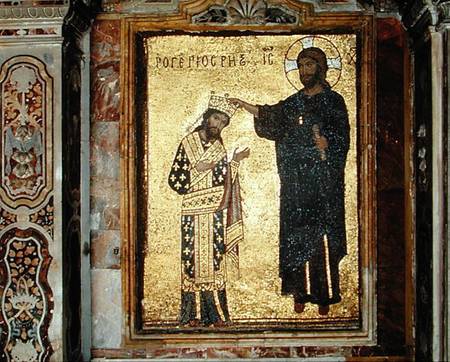 |
| Christ crowns Roger II of Sicily [art link] |
Roger Hauteville and his brother Robert Guiscard came to southern Italy and discovered the Byzantine Greek Christians living under Muslim rule by Moors from Tunisia. In 1061 the two brothers and an army took Messina, then captured Palermo in 1071. Over the next few years they expelled the Moors, and Roger became Count of Sicily. Roger had three wives and several children. One of his last children was also named Roger.
Roger II (22 December 1095-1154) became Count of Sicily in 1105, inheriting the title (and parts of Sicily) when his elder brother died. At the age of 16, he was named Count of Sicily and Calabria. In 1122, Roger's cousin, Duke William of Apulia, accepted Roger's help in dealing with an enemy; in exchange, he offered to renounce his claims to certain lands. When William died in 1127, Roger claimed all lands that had been distributed to members of the Hauteville family on Sicily and in the Italian peninsula: Calabria and Apulia, as well as Capua.
Pope Honorius II was wary of the growing power of Normans in southern Italy and Sicily, but his attempts to counter Roger with force or politics failed. By 1129, Roger's rule of Apulia was accepted by his neighbors. When Honorius died in 1130, Roger threw his support behind Anacletus II against Innocent II. Anacletus prevailed and, despite being later declared an antipope, he was able to reward his supporter with a papal bull declaring Roger King of Sicily. Roger was undisputed ruler of the island and much of southern Italy, a worthy kingdom indeed.
Roger continued to expand his territory. When Roger's sister, Matilda, who had married Ranulf II of Alife, came to Roger claiming to have been abused by her husband, Roger took Ranulf's lands as well as his brother's county.
Pope Anacletus died in 1138, and Pope Innocent II sent an army to teach Roger a lesson: the pope mistrusted the power of the expansive Kingdom of Sicily, and wanted a buffer state between Sicily and his own territory. Innocent thought Capua would make a good neutral space between the two. His army failed, however.
The King of Sicily had a long life and accomplished numerous things, but I'll mention just one more: Roger invented a new coin that would standardize monetary exchanges throughout the Mediterranean. He named this gold coin after the duchy of Apulia: the ducat. (To be honest, this coin failed to be widely adopted. The ducat with which we are familiar was introduced by Venice in 1284.)

No comments:
Post a Comment
Note: Only a member of this blog may post a comment.